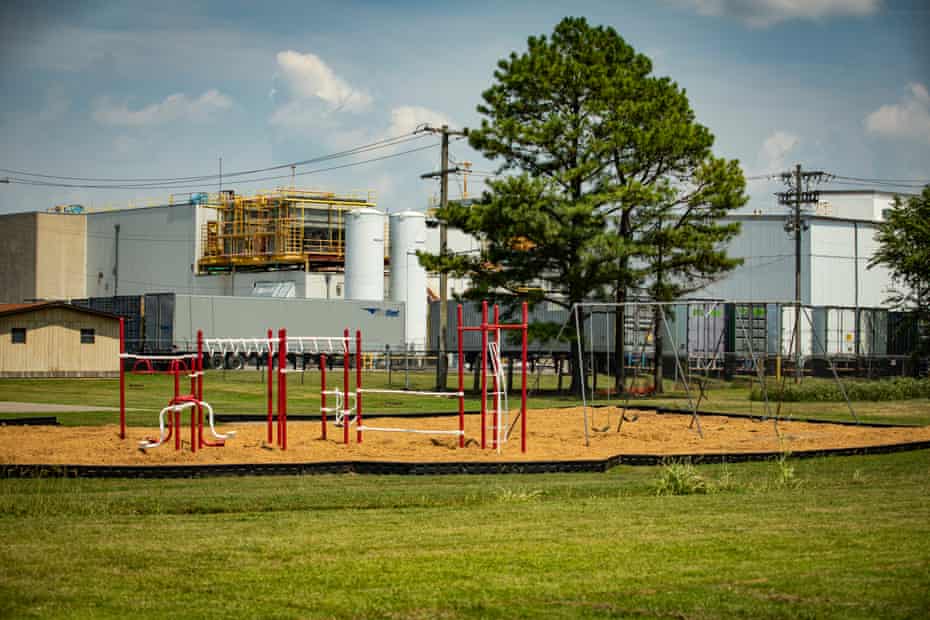‘They rake in profits – everyone else suffers’: US workers lose out as big chicken gets bigger

Revealed: investigation shows how Tyson’s near monopoly in its home state of Arkansas gives it huge power, at a cost to farmers and the environment
Last modified on Wed 11 Aug 2021 09.19 EDT
The tight grip that America’s largest meat processing company has on the chicken industry has generated dire consequences for its workers, farmers and the environment in one of the US’s leading poultry-producing states, an investigation has found.
Tyson Foods is ranked 73rd on the Fortune 500 list, with a revenue of $43bn in the last fiscal year.
Tyson accounts for the single largest share of chicken plants across the US, processing 2.3 billion birds in 2020. The company supplies burgers and nuggets, among other chicken products, to chains including Walmart, McDonalds, KFC and Taco Bell, as well as schools and prisons.
In Arkansas, where the multinational is headquartered, the company currently accounts for an estimated two-thirds of processed poultry sales, a joint investigation by the Guardian and the Union of Concerned Scientists (UCS) reveals.
Its near monopoly in Arkansas, which reflects national and global trends in the meat industry, has been built over the past three decades by exploiting weakened antitrust regulations to acquire dozens of smaller companies and facilities.
Our findings suggest that this power has been used to dictate contracts and erode conditions for farmers and workers in plants in Arkansas, where it is the third-biggest employer.
Tyson and the other three top firms control about 87% of poultry production in the state. Economists and food justice advocates largely agree that consumers, farmers, workers, small companies and the planet lose out if the top four firms control 40% or more of any market. One grassroots labor organizer told the Guardian: “This is corporate America and it’s failed the people.”
The five-month investigation is based on research and analysis of the most recently available economic, government and industry data, and interviews with labor and farming advocates as well as current and former workers at three Tyson plants.
Its findings include:
-
Market dominance: Tyson operates almost half the poultry slaughter and processing facilities in Arkansas – the state with the largest number of plants and contract farms in the country.
-
Farm closures: A complex contracting system used by Tyson and other major processors has coincided with the closure and consolidation of thousands of poultry farms.
-
Employee benefits cut: Some breaks and bonuses have been curbed, including combining the previously separate annual Thanksgiving and Christmas dinners.
-
A points-based disciplinary system is used to pressure employees to comply with obligatory overtime which keeps many fearful employees working even when injured or sick.
-
Covid outbreaks: Measures to limit the spread of Covid have been inadequate or poorly implemented, resulting in multiple deaths at its Arkansas plants.
-
Misleading job advertisements offering new recruits $15 per hour are deceptive as most roles are excluded, according to employees. The Guardian interviewed workers with more than 20 years at Tyson earning below $14 an hour.
-
Speed and output targets are prioritized over employee welfare, hygiene and food safety, according to workers from three plants interviewed by the Guardian.
-
Cockroaches, flies and crickets are rife in some plants and can end up in chicken nuggets and burgers supplied to schools, fast food joints and supermarkets, workers said.
The findings follow a recent investigation by the Guardian into the far-reaching negative consequences of America’s monopolized food system.
“This is what happens when regulators and the government just stop caring about competitiveness in our economy, said the economist Rebecca Boehm, lead author of the new UCS report Tyson spells trouble for Arkansas, which is also published today. “When a company like Tyson can get so big and powerful, where they have a near monopoly and monopsony in their industry, they make their own rules and rake in profits, while everyone else suffers.”
Tyson contracts farmers to raise millions of chicks and then dispose of the litter generated in the densely confined factory farms. In 2017, its Arkansas farms produced about 50bn lb of this fecal waste – which is used as fertilizer but which studies show contributes to poor air quality and can contaminate local waterways. Large Latino and Indigenous communities in Benton and Washington counties are disproportionately impacted.
Plant workers and residents are blighted by offensive odors and noise pollution, which have a detrimental impact on their health, quality of life and house prices. “I don’t complain because I don’t want to alienate the biggest employer in the area, but I haven’t had people over in almost 20 years,” said Matthew Pelto, a homeowner who lives opposite Tyson’s huge plant in downtown Springdale.
In a statement, Tyson said it took its responsibilities as a large employer in its home state seriously and supported staff. It denied a points-based system was used to pressure employees to keep working when sick or injured, said compensation and benefits had increased overall, and denied output targets were prioritized over welfare, safety and hygiene. A spokesman said employees were free to raise concerns without fear of retaliation.

Founded in Arkansas in 1935, Tyson is one of the world’s largest food companies, with 139,000 US employees and 177 slaughter and processing plants across 21 states. Its grocery brands include old American regional favorites such as Hillshire Farms, Jimmy Dean and State Fair.
Like other meat processing conglomerates, Tyson now controls almost every part of its supply chain, including the mills that process grains into animal feed and the hatcheries that produce eggs. It contracts farmers for their labor raising chicks, paying them according to how well they perform compared with other farmers.
Tyson market growth has been helped by close political ties and tax breaks in Arkansas dating back to when Bill Clinton was governor. Tyson spends big on politics, having invested a total of nearly $18m in lobbying and more than $300,000 in campaign contributions per election cycle since 2010. Arkansas is where the company spends most.
The company’s contribution to powerful food industry trade groups, which have spent almost $340m on lobbying and campaign contributions since 2007, is unknown.
The poultry industry in Arkansas has become dramatically less competitive since 2005 and is currently almost three times more consolidated than the antitrust threshold set by the Department of Justice. With 67% of poultry production sales, Tyson has been the biggest winner, our investigation found.
As a near monopoly, Tyson can largely dictate worker wages and prices for farmers, as well as a whole range of conditions and regulations affecting everything from animal welfare to worker safety to environmental hazards.
“The farmers are on a treadmill, earning only what the big corporations are willing to pay, regardless of the true labor and environmental costs,” said Joe Maxwell, president of Family Farm Action.
The Guardian was unable to find a former or current contract Tyson farmer in Arkansas willing to be interviewed.
Tyson did not respond to questions about its market share, but said last year the chicken industry overall had generated $9bn in economic activity in Benton and Washington counties.
‘They could fire me at any moment’
Born in central Mexico, Raquel Jimenez has lived in the US for 35 years – most of which she’s spent working for Tyson’s flagship Springdale plant.
Jimenez works six days a week at the imposing slaughter and processing facility, including obligatory overtime every Saturday even though she’d rather be home with her children and grandchildren. If she doesn’t go in, Jimenez will get one to three punitive points; 14 points gets you fired.
In the past, workers report, they earned two hours’ credit for every obligatory Saturday shift, but that benefit was cut several years back. Two half-hour breaks have been cut to one 20-minute break, during which workers must remove their protective gear, heat up their food, eat, go to the bathroom, redress, and be back on the line. Supervisors stand around the dining room, making sure no one is late back.

“We barely have time to eat and it’s tense and uncomfortable with them watching us. I’m fed up but it’s hard to complain. They could fire me at any moment,” said Jimenez.
Jimenez, like many of Tyson’s loyal workers who mostly originate from countries and territories including Mexico, Guatemala, El Salvador, Thailand, Puerto Rico and the Marshall Islands, has accumulated vacation days, which allow her to go home every December to spend Christmas with family. Recently, an announcement, seen by the Guardian, was pinned to a notice board advising that workers who had taken December vacation in the past three years would not be eligible to do so this year unless room was available.
“As Tyson has made more money, our benefits have been cut and cut. It’s very disheartening. If we were Americans, they wouldn’t treat us like this. It’s racism against migrants,” said Jimenez.
Covid exposed and exacerbated the risks faced by the US’s invisible meat processing workforce.
At the end of 2020, Jimenez became unwell at work, her body ached, and she felt exhausted. Covid cases were rising inside and outside the plant, but her supervisor insisted she was fine because she didn’t have a fever. She kept working, too scared of her “despot supervisor” to go home in case he gave her points for unauthorized absence. Shortly after she was diagnosed with Covid, her whole family got sick.
Today, Covid hospitalizations are at an all-time high in Arkansas, but public health measures are not being implemented in the plants, according to employees. “I’m constantly scared about getting Covid again,” said Jimenez, who earns $13.85 an hour – up from $9-something when she first started.
According to a spokesman, Tyson has invested more than $710m in Covid safety measures including a testing program, tells employees with symptoms or who have tested positive to stay at home and apply for short-term disability support, and recently announced that all its US employees must be vaccinated by 1 November.
He added: “We have a very large immigrant workforce and this is, for us, a source of pride.”
Magaly Licolli, director of the worker-based organization Venceremos, said: “Knowing that Tyson is allowed to exploit them weighs heavy on the workers’ shoulders, like they’re not seen as human beings, just labor. The people with power and influence in Arkansas are tied to big corporations and only interested in maintaining the status quo.”
Tyson has been fined at least $169m since 2000 for employment, antitrust and environmental violations, among others, including a $2m criminal penalty in 2018 for a massive fish kill in Missouri. It is named in several ongoing lawsuits for alleged negligence that allowed Covid to spread in its plants.

On a recent evening outside the Springdale plant, the stench and noise were intense. According to the workers interviewed by the Guardian, the conditions inside are considerably worse.
Mateo Ruiz has experienced hearing loss during his two decades at the plant. “Every year they see my hearing gets worse, but don’t refer me to a specialist or change anything. What’s the point of the tests?” said Ruiz, who builds car porches on top of his more than 50 hours a week at the plant to make ends meet.
At the entrance, a big sign promises a starting salary of $15 an hour in English and Spanish, but in reality that’s only for the toughest, least popular jobs such as deboning.
At least Ruiz gets to go home for some respite. Pelto, the 48-year-old IT worker who lives opposite the plant – which has grown substantially since his mother purchased the house in 1980 – cannot escape. “I don’t hate Tyson, they feed the world and supply lots of jobs, but the plant has a bad impact on my life. If I could afford to leave I would, but I’m stuck here.”
Green Forest is a small, dusty, rural town where Tyson’s huge slaughter and processing plant is the main employer – and currently advertising a $2,000 bonus for new recruits. It’s a tough region for migrants to live: the isolated town is located just over 20 miles from Harrison, a hub of white supremacist groups which has been labeled the US’s most racist town.
As an undocumented migrant from Guatemala, Ennelida Lopez worked for years for the biggest meat-packing companies across north-west Arkansas using fake IDs.
Since becoming a documented resident in 2016, she has worked at Tyson’s Green Forest plant, butchering chickens at breakneck speed. Staff shortages mean some assembly lines are periodically shut, which means her team is forced to work even faster, according to Lopez. The place stinks, she said, water leaks through the roof and cockroaches run around the dining room and employee lockers.
Lopez was diagnosed with breast cancer in 2019 and needed time off for surgery and radiotherapy. Last year she was among dozens of workers in the plant to get Covid, and infected her husband, also a Tyson employee, who was off work recovering from surgery. He died three days later.

“If the company had taken better care, I might not have gotten Covid and my husband would still be alive,” said Lopez in tears.
Lopez is currently half a point away from being fired and believes she has been punished for taking off so much time over the past two years. “We just want to be treated with dignity and paid fairly, but most people are too scared to complain in case they get fired. My days are numbered at Tyson because I got sick.”
The state ranks first in the country for the number of chicken slaughtering and processing plants, yet finding a new job close by isn’t easy: in half the 14 Arkansas counties where the big processors operate, Tyson is the only company, which can leave workers and contract farmers with few options, our investigation found.
‘Tyson earns billions while we have to work in brutal conditions for low pay’
Back in the day, the rise of companies like Tyson provided much-needed economic opportunities for rural white Americans. But as they got larger and more powerful, conditions deteriorated and the industry increasingly turned to immigrant communities.
Today, about 31,000 mostly Black and brown people work in Arkansas’ poultry slaughter and processing industry, accounting for 10% of the nationwide industry total. The jobs are often fast and repetitive, with workers exposed to hazards including chemicals, extreme temperatures, dangerous equipment, excessive noise and in some cases unfair and degrading treatment by supervisors and nurses.
According to 2019 data from the Bureau of Labor Statistics, nonfatal injury and illness rates in the poultry-processing industry were higher than in all other private industries.
Carlos Sanchez, 39, started working at a Tyson cooked meat plant a decade ago after construction jobs dried up. He’s a machine operator and says the quantity of chicken nuggets and burgers produced every shift has risen substantially since he started, while staff numbers have been cut. This can impact worker and food safety.

“The pressure is horrific. Line speed is more important than safety; workers are stressed, tired and rushing around. That’s why so many people fall. The [subcontracted] cleaners complain about the same problem. They do what they can but the machinery often stinks and there are cockroaches inside.”
Sanchez said he’s shown supervisors the cockroaches – as well as pointing out flies and crickets in the frozen blocks of ground chicken – but says he saw no action taken. The meat mixer just keeps on mixing.
Last month, Sanchez said he alerted a supervisor to the cross contamination of chicken labelled antibiotic-free with other meat, but was told to carry on. The company has previously been sanctioned for misleading labels about antibiotic use.
A Tyson spokesman said: “Our plants, processes, and meats are routinely checked by USDA [government inspectors] as well as our third-party auditors for quality and safety.”
Tyson, like other companies, is facing acute staff shortages at some plants, but despite recruitment incentives, staff retention is low due to the tough conditions and sub-$15-per-hour pay most receive, according to the employees interviewed by the Guardian. In recent years, numerous national lawsuits revealed how Tyson and other major processors have tried to exploit their market dominance by fixing prices and wages.
Sanchez said: “Tyson earns billions while we have to work in brutal conditions for low pay. I would never recommend anyone work for the company.”
-
The Guardian offered all the workers we spoke to the opportunity to tell their stories anonymously. Some names have been changed
